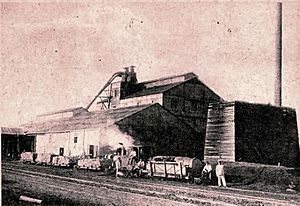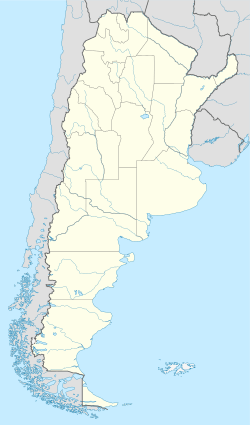Villa Ángela facts for kids
Quick facts for kids
Villa Ángela
|
|
|---|---|

Quebracho extract factory La Chaqueña S.A. in Villa Ángela
|
|
| Country | |
| Province | |
| Department | Mayor L. J. Fontana |
| Founded | 1910 |
| Elevation | 70 m (230 ft) |
| Population
(2010 census)
|
|
| • Total | 41,403 |
| Time zone | UTC−3 (ART) |
| CPA base |
H3540
|
| Dialing code | +54 3735 |
| Climate | Cwa |
| Website | Official website: https://web.archive.org/web/20121211070213/http://www.villaangela.gov.ar/ |
Villa Ángela is a city in the Chaco province of Argentina. It is about 186 kilometers (116 miles) west of Resistencia, the capital city of the province.
The city is located in the Gran Chaco region. This is a large lowland area that is part of the Río de la Plata basin. In 2010, Villa Ángela had about 41,403 people living there. This makes it the third-largest city in the Chaco province.
Contents
History of Villa Ángela
How Villa Ángela Started
In 1908, two men named Carlos Gruneisen and Julio Ulises Martin bought the land where Villa Ángela is today. Julio Ulises Martin was from Switzerland. He was also known for creating a company called Yerbatera Martin in Rosario.
Soon after, they built a factory called La Chaqueña S.A.. This factory made tannin, which is a substance used in many industries. As the factory grew, people started to settle in the areas nearby.
Naming the City
At first, the area was just a small village. People called it Punta de rieles or km 95. In 1910, the founders decided to officially create a village. They named it Villa Ángela. This was done to honor the 100th anniversary of the May Revolution in Argentina.
The city was named after Ángela Joostens. She was the wife of Julio Ulises Martin, one of the founders.
Villa Ángela is known for its big Carnaval celebrations. This popular festival happens every year. It usually starts in mid-January and lasts until mid-February. The tradition of this Carnaval began in 1950.
Weather in Villa Ángela
The weather in Villa Ángela is subtropical. This means it has warm temperatures for most of the year. Winters are usually dry. Summers are very wet and hot.
- The highest temperature ever recorded was 46 °C (115 °F).
- The lowest temperature ever recorded was -6 °C (21 °F).
- On average, the city gets about 1,100 mm (43 inches) of rain each year.
| Climate data for Villa Ángela (1941–1950) | |||||||||||||
|---|---|---|---|---|---|---|---|---|---|---|---|---|---|
| Month | Jan | Feb | Mar | Apr | May | Jun | Jul | Aug | Sep | Oct | Nov | Dec | Year |
| Record high °C (°F) | 43.8 (110.8) |
44.4 (111.9) |
42.3 (108.1) |
36.9 (98.4) |
34.1 (93.4) |
33.4 (92.1) |
33.4 (92.1) |
40.9 (105.6) |
42.6 (108.7) |
44.4 (111.9) |
44.1 (111.4) |
44.2 (111.6) |
44.4 (111.9) |
| Mean daily maximum °C (°F) | 36.3 (97.3) |
35.1 (95.2) |
31.5 (88.7) |
28.3 (82.9) |
24.3 (75.7) |
21.6 (70.9) |
21.4 (70.5) |
25.7 (78.3) |
28.1 (82.6) |
30.6 (87.1) |
32.7 (90.9) |
35.6 (96.1) |
29.3 (84.7) |
| Daily mean °C (°F) | 27.2 (81.0) |
26.4 (79.5) |
23.3 (73.9) |
20.2 (68.4) |
17.4 (63.3) |
14.5 (58.1) |
13.6 (56.5) |
16.6 (61.9) |
19.2 (66.6) |
22.0 (71.6) |
24.3 (75.7) |
26.9 (80.4) |
21.0 (69.8) |
| Mean daily minimum °C (°F) | 19.9 (67.8) |
19.8 (67.6) |
17.6 (63.7) |
14.7 (58.5) |
11.6 (52.9) |
9.1 (48.4) |
7.7 (45.9) |
9.2 (48.6) |
12.4 (54.3) |
14.3 (57.7) |
16.5 (61.7) |
18.5 (65.3) |
14.3 (57.7) |
| Record low °C (°F) | 8.8 (47.8) |
9.0 (48.2) |
7.0 (44.6) |
2.6 (36.7) |
−1.6 (29.1) |
−4.0 (24.8) |
−5.6 (21.9) |
−4.1 (24.6) |
−0.3 (31.5) |
1.1 (34.0) |
8.4 (47.1) |
8.9 (48.0) |
−5.6 (21.9) |
| Average precipitation mm (inches) | 116 (4.6) |
143 (5.6) |
126 (5.0) |
99 (3.9) |
44 (1.7) |
33 (1.3) |
32 (1.3) |
15 (0.6) |
48 (1.9) |
73 (2.9) |
98 (3.9) |
75 (3.0) |
902 (35.5) |
| Source: Sistema de Clasificación Bioclimática Mundial | |||||||||||||
See also
 In Spanish: Villa Ángela para niños
In Spanish: Villa Ángela para niños


